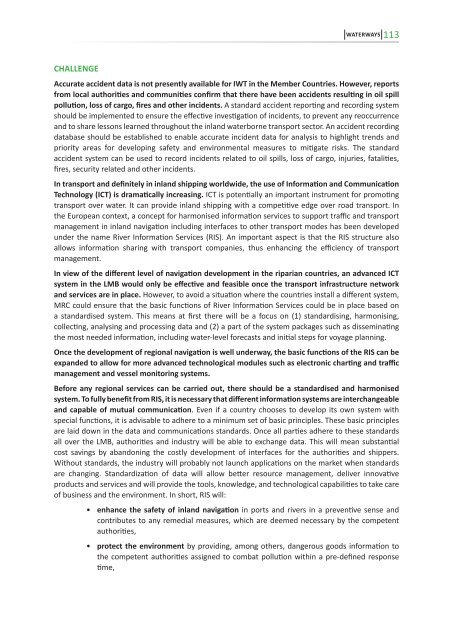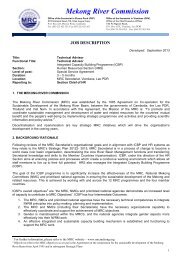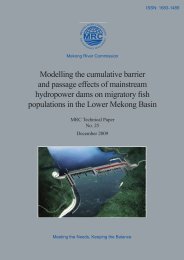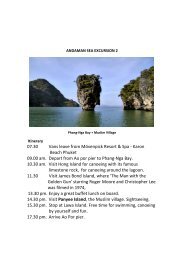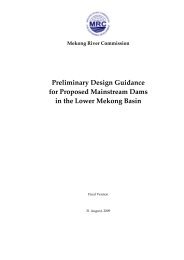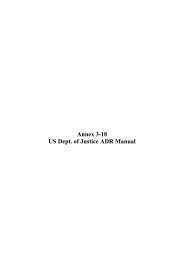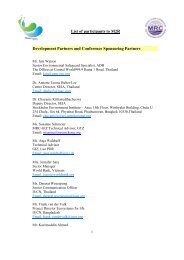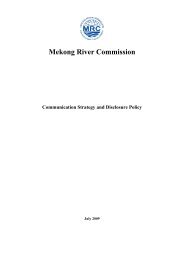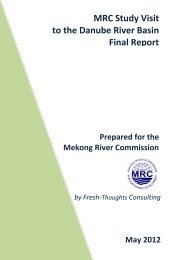Carriage, Handling and Storage of Dangerous Goods along
Carriage, Handling and Storage of Dangerous Goods along
Carriage, Handling and Storage of Dangerous Goods along
Create successful ePaper yourself
Turn your PDF publications into a flip-book with our unique Google optimized e-Paper software.
CHALLENGE<br />
WATERWAYS 113<br />
Accurate accident data is not presently available for IWT in the Member Countries. However, reports<br />
from local authorities <strong>and</strong> communities confirm that there have been accidents resulting in oil spill<br />
pollution, loss <strong>of</strong> cargo, fires <strong>and</strong> other incidents. A st<strong>and</strong>ard accident reporting <strong>and</strong> recording system<br />
should be implemented to ensure the effective investigation <strong>of</strong> incidents, to prevent any reoccurrence<br />
<strong>and</strong> to share lessons learned throughout the inl<strong>and</strong> waterborne transport sector. An accident recording<br />
database should be established to enable accurate incident data for analysis to highlight trends <strong>and</strong><br />
priority areas for developing safety <strong>and</strong> environmental measures to mitigate risks. The st<strong>and</strong>ard<br />
accident system can be used to record incidents related to oil spills, loss <strong>of</strong> cargo, injuries, fatalities,<br />
fires, security related <strong>and</strong> other incidents.<br />
In transport <strong>and</strong> definitely in inl<strong>and</strong> shipping worldwide, the use <strong>of</strong> Information <strong>and</strong> Communication<br />
Technology (ICT) is dramatically increasing. ICT is potentially an important instrument for promoting<br />
transport over water. It can provide inl<strong>and</strong> shipping with a competitive edge over road transport. In<br />
the European context, a concept for harmonised information services to support traffic <strong>and</strong> transport<br />
management in inl<strong>and</strong> navigation including interfaces to other transport modes has been developed<br />
under the name River Information Services (RIS). An important aspect is that the RIS structure also<br />
allows information sharing with transport companies, thus enhancing the efficiency <strong>of</strong> transport<br />
management.<br />
In view <strong>of</strong> the different level <strong>of</strong> navigation development in the riparian countries, an advanced ICT<br />
system in the LMB would only be effective <strong>and</strong> feasible once the transport infrastructure network<br />
<strong>and</strong> services are in place. However, to avoid a situation where the countries install a different system,<br />
MRC could ensure that the basic functions <strong>of</strong> River Information Services could be in place based on<br />
a st<strong>and</strong>ardised system. This means at first there will be a focus on (1) st<strong>and</strong>ardising, harmonising,<br />
collecting, analysing <strong>and</strong> processing data <strong>and</strong> (2) a part <strong>of</strong> the system packages such as disseminating<br />
the most needed information, including water-level forecasts <strong>and</strong> initial steps for voyage planning.<br />
Once the development <strong>of</strong> regional navigation is well underway, the basic functions <strong>of</strong> the RIS can be<br />
exp<strong>and</strong>ed to allow for more advanced technological modules such as electronic charting <strong>and</strong> traffic<br />
management <strong>and</strong> vessel monitoring systems.<br />
Before any regional services can be carried out, there should be a st<strong>and</strong>ardised <strong>and</strong> harmonised<br />
system. To fully benefit from RIS, it is necessary that different information systems are interchangeable<br />
<strong>and</strong> capable <strong>of</strong> mutual communication. Even if a country chooses to develop its own system with<br />
special functions, it is advisable to adhere to a minimum set <strong>of</strong> basic principles. These basic principles<br />
are laid down in the data <strong>and</strong> communications st<strong>and</strong>ards. Once all parties adhere to these st<strong>and</strong>ards<br />
all over the LMB, authorities <strong>and</strong> industry will be able to exchange data. This will mean substantial<br />
cost savings by ab<strong>and</strong>oning the costly development <strong>of</strong> interfaces for the authorities <strong>and</strong> shippers.<br />
Without st<strong>and</strong>ards, the industry will probably not launch applications on the market when st<strong>and</strong>ards<br />
are changing. St<strong>and</strong>ardization <strong>of</strong> data will allow better resource management, deliver innovative<br />
products <strong>and</strong> services <strong>and</strong> will provide the tools, knowledge, <strong>and</strong> technological capabilities to take care<br />
<strong>of</strong> business <strong>and</strong> the environment. In short, RIS will:<br />
• enhance the safety <strong>of</strong> inl<strong>and</strong> navigation in ports <strong>and</strong> rivers in a preventive sense <strong>and</strong><br />
contributes to any remedial measures, which are deemed necessary by the competent<br />
authorities,<br />
• protect the environment by providing, among others, dangerous goods information to<br />
the competent authorities assigned to combat pollution within a pre-defined response<br />
time,


